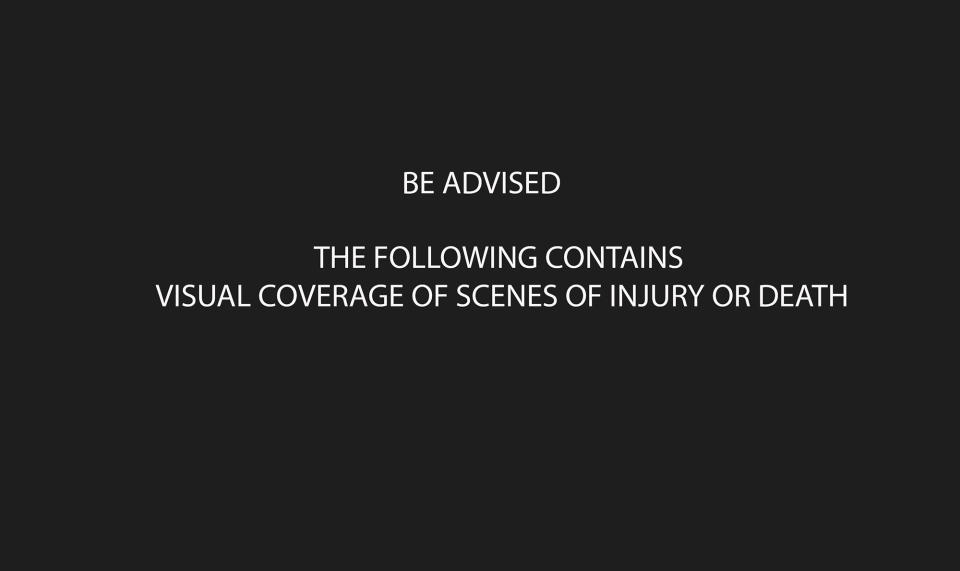Aid workers describe 'apocalyptic' scenes in Mariupol, a Ukrainian city under siege
Mariupol, a Ukrainian port city that was home to more than 400,000 people just two weeks ago, has been almost completely shut off from the outside world by advancing Russian forces.
Russian soldiers have encircled the city, which is strategically located along the Sea of Azov in southeastern Ukraine. The civilians stuck in the city have now been without water, electricity and heat for more than a week. Food supplies are running dangerously low, and residents have reportedly turned to eating snow and drinking from puddles to survive.
“It’s apocalyptic,” Diana Santana, spokesperson for the International Committee of the Red Cross (ICRC), told Yahoo News of the humanitarian crisis in Mariupol. According to Santana, internet connectivity is so limited in the region that communication inside the city is nearly impossible.
For its part, the Ukrainian government says it is trying to evacuate residents of the city. But that requires cooperation from the Russian troops laying siege to Mariupol.
On Wednesday, Ukraine’s deputy prime minister, Iryna Vereshchuk, announced a daylong ceasefire to allow civilians to leave cities under attack from Russia via “humanitarian corridors.” She said Russia had agreed to the brief truce, but Ukraine has accused Russia of violating similar agreements and firing on civilians since the invasion began late last month.
On Tuesday, multiple attempts to evacuate civilians from Mariupol and deliver much-needed food, medicine and water failed after Ukraine said the emergency corridors came under fire.
Moscow has also announced its own safe routes for civilians to escape, but most of them lead into Russia or Belarus, a Kremlin ally that served as a staging ground for the invasion.
Ukrainian officials have called Russia’s offers of safe passage “cynical and immoral.” And the confusion on the ground has made humanitarian efforts that much more challenging.
“The humanitarian situation in Mariupol is catastrophic,” Laurent Ligozat, Doctors Without Borders’ emergency coordinator in the western Ukrainian city of Lviv, said in a recent statement. “Hospitals, supermarkets, and residential buildings have suffered heavy damages. And it is not possible to bring any relief supplies into the city.”
A few passages through the safe corridor were successful late Tuesday, according to the ICRC, though hundreds of thousands of residents remain in Mariupol, many of whom are in desperate need of food or aid. Most are still hunkered down in homes and shelters as Russia continues firing missiles and artillery shells into the city.
“The situation is indeed worrisome and the needs are increasing each day,” Santana said. “Civilians are dealing with survival, and separately you have people that are fighting. There are a lot of different things happening and a lot of different movements.”
Continuous Russian shelling of the city has killed at least 1,170 people, Deputy Mayor Sergei Orlov said, and at least 47 people were buried in a mass grave Wednesday. According to the Associated Press, dead bodies line the city’s streets as residents search desperately for food, warmth and safety from the Russian bombardment.
On Wednesday, Mariupol officials said Russia had destroyed a children’s hospital in the city. “The destruction is colossal,” the City Council said in a statement. Ukrainian President Volodymyr Zelensky also tweeted a video that he said was footage of the devastation.
“People, children are under the wreckage,” he wrote. “Atrocity! How much longer will the world be an accomplice ignoring terror?”
Ukrainian authorities said on Tuesday that an 8-year-old girl in the city had died from dehydration. “In the last minutes of her life she was alone, exhausted, frightened, terribly thirsty,” Mariupol Mayor Vadym Boichenko said in a chilling post on Telegram. “This is just one of many stories from Mariupol, which has been in the blockade for eight days.”
The humanitarian efforts of groups like the ICRC and Doctors Without Borders continue despite deteriorating conditions on the ground. And many local aid workers have chosen to stay and continue to work in the city.
“For many of our staff, Mariupol is home, where they have families and friends,” Ligozat, the Doctors Without Borders official, said. “They know that if they leave the city now, they may never come back, they may never see their homes. ... So, they know it’s a life-altering choice for them.”
But for many civilians, the Russian invasion has already taken away everything they own.
“It’s me and my family — my daughter-in-law, my son, my daughter and my grandmother,” a woman named Nataylia, who was staying in a shelter with 100 other people in the city’s center, told ICRC personnel. “We fled from the Artana area under bomb explosions. Shells fell directly on our heads, so we ran away in what we were wearing to the basement. We need everything now.”
Upwards of 2.2 million people have fled Ukraine since Russia invaded the country on Feb. 24, Filippo Grandi, the head of the United Nations’ refugee agency, UNHCR, said Wednesday.
Reports of alleged war crimes carried out by Russia on Ukrainian civilians are being investigated by the International Criminal Court. Moscow is also accused of using cluster munitions and devastating vacuum bombs, which the White House says may be a violation of the rules of war.
But Santana, the ICRC official, said she is hopeful that the international humanitarian rules of war, established by the Geneva Convention more than 70 years ago, will ultimately be upheld.
“There are a lot of emotions involved, but there is also a playbook that they should be following, and that’s the point of international humanitarian law,” she said.
More images from Mariupol


 Yahoo News
Yahoo News 

